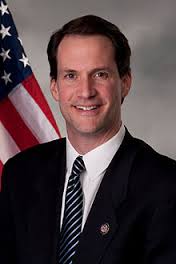Liberal stalwarts such as Sen. Elizabeth Warren, D-Mass., and even President Obama opposed language in the $1 trillion omnibus spending bill that ratchets back provisions in the 2010 Dodd-Frank law restricting bank trading in potentially toxic derivatives.
But Rep. Jim Himes, D-Conn., a key architect of the section in Dodd-Frank that put derivatives under regulatory control for the first time, actually supported the proposed revision _ and ultimately was among the 57 House Democrats who voted for the overall spending bill, which passed 219-206 late Thursday.
In fact, Himes expressed his support for it in 2012 and voted for it on the House floor in October 2013, along with 69 other Democrats.
As the clock on Capitol Hill ticked down Thursday to a deadline for passing a bill to fund the government, Himes was in no-comment mode.
But his spokesman, Greg Vadala, said the revision would cover “plain vanilla’’ swaps, not the “toxic’’ variety that brought down insurance giant American International Group (AIG) in 2008, a major contributor to the Great Recession.
“Jim and others in Congress have long argued the most dangerous derivatives would still be kept away from government-backed banks under the provision,” he said.
Derivatives are essentially market trades on future prices for commodities and other items. While banks expose themselves to huge potential risks _ as happened in the financial crisis that started in 2007 _ airlines, farms and other entities confronting sharp price fluctuations depend on derivatives for financial stability.
At issue in the Dodd-Frank revision included in the omnibus spending bill is the “push-out’’ provision, which requires banks to spin off any derivatives-trading business into separate entities not covered by federal deposit insurance.
Himes and other Democrats, including former Rep. Barney Frank, D-Mass., whose name is on the law as former chair of the House Financial Services Committee, have argued that while it is important to maintain safeguards against a future AIG-type meltdown that could require a taxpayer bailout, there were “valid criticisms’’ that needed to be addressed.
Himes and other supporters argue the law should permit banks to help farmers, airlines and others manage risk while maintaining controls on other kinds of derivatives trading that are too risky.
But that position put Himes and the others in conflict with Warren, the heart-and-soul of the Democratic left on Capitol Hill.
Many if not most Republicans support full repeal of Dodd-Frank but at a minimum most appeared pleased on Thursday that the “push-out’’ provision was being rolled back.
On the Democratic side, the picture was more muddled.
In a statement, the White House on Thursday condemned “ideological and special interest riders in the House bill,’’ especially the Dodd-Frank provision that would “weaken a critical component of financial system reform aimed at reducing taxpayer risk.’’
At the same time, the statement urged passage of the overall bill. Throughout the day, administration officials including Obama and Vice President Joe Biden furiously dialed up Democrats to get them to vote “yes’’ on it.
House Minority Leader Nancy Pelosi, D-Calif., sent a “dear colleague’’ letter to Democrats saying Republicans lacked the votes to pass the spending bill, increasing Democrats’ “leverage’’ to eliminate provisions including the Dodd-Frank revision. Thursday’s House vote was widely seen as a defeat for the liberal Warren-Pelosi wing of the Democratic Party.
For Himes, a former Goldman Sachs executive often accused by left-leaning progressive groups of being a Wall Street shill, changes to Dodd-Frank are a double-edged sword.
Himes in the past has tried to ward off left-liberal accusations by stressing his role in getting the derivatives language into Dodd-Frank in the first place. But his support of the spending bill’s Dodd-Frank revision may cost him support on his left flank.
“Easing regulations on big Wall Street banks . . . would represent Democrats marching in the exact wrong direction,’’ said Adam Green, co-founder of the Progressive Change Campaign Committee, which railed against Himes when he was briefly under consideration last month to lead the Democratic Congressional Campaign Committee.
Congress, he said, should “answer Elizabeth Warren’s call to remove provisions like these that put the big guy ahead of the little guy.’’
